I need to make Selection sort program using SICXE assember t
I need to make Selection sort program using SIC/XE assember.
this is problem. -> Receive, as keyboard input, a series of numbers until EOF.
Input example: 5 7 9 2 3 1 4 EOF
Design a SIC or SIC/XE program
-----------------------------------------------------
and I have a example of code but i can\'t copy this
. This program does the selection sort algorithm.
. Author: Naum Gjorgjeski
ss START 0
. initialize stack pointer
JSUB init
. selection sort starts here
. X = indice of the first unsorted element
LDX bound
. find the minumum element in the unsorted part of the array and return its indice in T
loopmin JSUB minind
. store X and T registers (indices of the first unsorted element and the minimum element in the unsorted part)
STX swap1
STT swap2
JSUB swap
. print the array
JSUB echotab
. X = boundary between the sorted and unsorted part of the array
LDX bound
. T = 3 bytes(1 word)
LDT #3
. we have made one iteration of the selection sort algorithm, so we have increased the boundary between the sorted and unsorted
. part of the array for 1 byte
. X = X + 1 byte (that\'s the indice of next element in the array)
ADDR T, X
. store the current boundary between the sorted and unsorted part of the array in bound
STX bound
. T = length of the array
LDT #len
COMPR X, T
. if the boundary between the sorted and unsorted part of the array is equal to the array length, the algorithm has done its job
. then we halt the algorithm
JEQ halt
J loopmin
halt J halt
END ss
. dirties A, S, X
. return the indice of the minumum element in T
. find the minumum element in the unsorted part of array
. in bound we load and store the boundary between the sorted and unsorted part of the array
minind STA olda
STS olds
STX oldx
. we start searching for the minumum element right of the boundary between the sorted and unsorted part of the array
LDX bound
. A = initialize the current minimum element (it\'s the first element in the unsorted part of the array)
LDA tab, X
. T = indice of the minimum element
LDT bound
. S = 3 bytes, the length of a word in SIC/XE
minloop LDS #3
. increase the boundary for 1 word (3 bytes)
ADDR S, X
. S = length of array
LDS #len
COMPR X, S
. if we have reached the end of the array, jump out of the loop
JEQ out4
. S = the element in the array with index X
LDS tab, X
COMPR A, S
. if A < S, jump back to the loop
JLT minloop
.if A > S, correct the minumum element and the indice of the minumum element (S = A and T = X)
RMO S, A
RMO X, T
. jump back to the loop
J minloop
out4 LDA olda
LDS olds
LDX oldx
RSUB
. dirties A, S, X
. swap two elements in the array (the indices are in swap1 and swap2)
. we must access an element in the array through the index register X
swap STA olda
STS olds
STX oldx
LDX swap1
. load the first element in A
LDA tab, X
LDX swap2
. load the second element in S
LDS tab, X
. store the first element at the second element\'s indice
STA tab, X
LDX swap1
. store the second element at the first element\'s indice
STS tab, X
LDA olda
LDS olds
LDX oldx
RSUB
. dirties A, X
. push register L to stack because we are calling the echonum subroutine inside the echotab subroutine
echotab STL @stackptr
JSUB push
STA olda
STX oldx
. X = 0 , start index
CLEAR X
. A = array element (number) at index X
looptab LDA tab, X
. print the number
JSUB echonum
. print space
LDA space
test2 TD stdout
JEQ test2
WD stdout
. A = boundary between the sorted and unsorted part of the array
LDA bound
COMPR A, X
. if X = A (the boundary), print vertical line and space after it
JEQ dline
. else jump that part
J noline
dline LDA line
test3 TD stdout
JEQ test3
WD stdout
LDA space
test5 TD stdout
JEQ test5
WD stdout
. A = 3 bytes (1 word)
. ce je konec tabele koncaj z izpisovanjem, ce ne vrni se v zanki in izpisi naslednje stevilo
noline LDA #3
. X = X + 3 bytes (1 word)
ADDR A, X
. A = length of the array
LDA #len
. if X = A, we have reached the end of the array (we have printed the whole array)
. if X = A, we should print new line and return from the subroutine
COMPR X, A
JEQ out1
. else go back to the loop and print the next number
J looptab
. print newline
out1 LDA newline
test1 TD stdout
JEQ test1
WD stdout
. pop register L from the stack
JSUB pop
LDL @stackptr
LDA olda
LDX oldx
RSUB
. dirties A, T, S, X
. print certain number in the array
echonum STA olda
STS olds
STT oldt
STX oldx
. divide the number with 10 and store the digits in the memory
CLEAR X
calc LDS #10
RMO A, T
DIVR S, A
. if A / 10 = 0, then go out of the loop
COMP #0
JEQ out2
. calculate the digit and store it in memory
MULR A, S
RMO T, A
SUBR S, A
STA memdig, X
RMO T, A
LDS #10
DIVR S, A
. X = X + 3 bytes (1 word)
LDT #3
ADDR T, X
J calc
. store in memory the last remaining digit (the actual first digit in the number)
out2 STT memdig, X
LDT #3
ADDR T, X
. iterate over memory and write the numbers backwards (the last stored digit will be printed first)
print LDT #3
. X = X - 3 bytes(1 word)
SUBR T, X
LDA memdig, X
. add 48 (gonum) to get the ASCII code of the digit
ADD gonum
test4 TD stdout
JEQ test4
WD stdout
. subtract 48 to go back
SUB gonum
LDT #0
COMPR X, T
. if X = 0, we have printed the number, and we can jump out
JEQ out3
J print
out3 LDA olda
LDS olds
LDT oldt
LDX oldx
RSUB
. dirties A
. initialize the stack pointer
init STA olda
LDA #stack
STA stackptr
LDA olda
. dirties A
. push to stack
push STA olda
LDA stackptr
ADD #3
STA stackptr
LDA olda
RSUB
. dirties A
. pop from stack
pop STA olda
LDA stackptr
SUB #3
STA stackptr
LDA olda
RSUB
. the array to sort
tab WORD 23
WORD 18
WORD 4
WORD 63
WORD 40
WORD 79
WORD 2
WORD 11
WORD 12
WORD 1
WORD 90
WORD 45
WORD 22
WORD 7
WORD 6
last EQU *
. length of the array
len EQU last-tab
. boundary between the sorted and unsorted part of the array
bound WORD 0
. ASCII code of newline
newline WORD 10
. ASCII code of space
space WORD 32
. ASCII code of vertical line
line WORD 124
. reserved words for indices of elements we want to swap
swap1 RESW 1
swap2 RESW 1
. reserved words for storing the registers when we start a subroutine
olda RESW 1
olds RESW 1
oldt RESW 1
oldx RESW 1
stdout BYTE X\'01\'
. 48 - go to ASCII
gonum WORD X\'000030\'
. memory for the digits of a number
memdig RESW 10
. reserved memory for stack pointer and stack
stackptr RESW 1
stack RESW 50
----------------------------------------------------
but I can\'t use this program.. because this program input is already set and open source.
like this code I want to get.. not changing c code to assembly code
Solution
ss START 0
. initialize stack pointer
JSUB init
. selection sort starts here
. X = indice of the first unsorted element
LDX bound
. find the minumum element in the unsorted part of the array and return its indice in T
loopmin JSUB minind
. store X and T registers (indices of the first unsorted element and the minimum element in the unsorted part)
STX swap1
STT swap2
JSUB swap
. print the array
JSUB echotab
. X = boundary between the sorted and unsorted part of the array
LDX bound
. T = 3 bytes(1 word)
LDT #3
. we have made one iteration of the selection sort algorithm, so we have increased the boundary between the sorted and unsorted
. part of the array for 1 byte
. X = X + 1 byte (that\'s the indice of next element in the array)
ADDR T, X
. store the current boundary between the sorted and unsorted part of the array in bound
STX bound
. T = length of the array
LDT #len
COMPR X, T
. if the boundary between the sorted and unsorted part of the array is equal to the array length, the algorithm has done its job
. then we halt the algorithm
JEQ halt
J loopmin
halt J halt
END ss
. dirties A, S, X
. return the indice of the minumum element in T
. find the minumum element in the unsorted part of array
. in bound we load and store the boundary between the sorted and unsorted part of the array
minind STA olda
STS olds
STX oldx
. we start searching for the minumum element right of the boundary between the sorted and unsorted part of the array
LDX bound
. A = initialize the current minimum element (it\'s the first element in the unsorted part of the array)
LDA tab, X
. T = indice of the minimum element
LDT bound
. S = 3 bytes, the length of a word in SIC/XE
minloop LDS #3
. increase the boundary for 1 word (3 bytes)
ADDR S, X
. S = length of array
LDS #len
COMPR X, S
. if we have reached the end of the array, jump out of the loop
JEQ out4
. S = the element in the array with index X
LDS tab, X
COMPR A, S
. if A < S, jump back to the loop
JLT minloop
.if A > S, correct the minumum element and the indice of the minumum element (S = A and T = X)
RMO S, A
RMO X, T
. jump back to the loop
J minloop
out4 LDA olda
LDS olds
LDX oldx
RSUB
. dirties A, S, X
. swap two elements in the array (the indices are in swap1 and swap2)
. we must access an element in the array through the index register X
swap STA olda
STS olds
STX oldx
LDX swap1
. load the first element in A
LDA tab, X
LDX swap2
. load the second element in S
LDS tab, X
. store the first element at the second element\'s indice
STA tab, X
LDX swap1
. store the second element at the first element\'s indice
STS tab, X
LDA olda
LDS olds
LDX oldx
RSUB
. dirties A, X
. push register L to stack because we are calling the echonum subroutine inside the echotab subroutine
echotab STL @stackptr
JSUB push
STA olda
STX oldx
. X = 0 , start index
CLEAR X
. A = array element (number) at index X
looptab LDA tab, X
. print the number
JSUB echonum
. print space
LDA space
test2 TD stdout
JEQ test2
WD stdout
. A = boundary between the sorted and unsorted part of the array
LDA bound
COMPR A, X
. if X = A (the boundary), print vertical line and space after it
JEQ dline
. else jump that part
J noline
dline LDA line
test3 TD stdout
JEQ test3
WD stdout
LDA space
test5 TD stdout
JEQ test5
WD stdout
. A = 3 bytes (1 word)
. ce je konec tabele koncaj z izpisovanjem, ce ne vrni se v zanki in izpisi naslednje stevilo
noline LDA #3
. X = X + 3 bytes (1 word)
ADDR A, X
. A = length of the array
LDA #len
. if X = A, we have reached the end of the array (we have printed the whole array)
. if X = A, we should print new line and return from the subroutine
COMPR X, A
JEQ out1
. else go back to the loop and print the next number
J looptab
. print newline
out1 LDA newline
test1 TD stdout
JEQ test1
WD stdout
. pop register L from the stack
JSUB pop
LDL @stackptr
LDA olda
LDX oldx
RSUB
. dirties A, T, S, X
. print certain number in the array
echonum STA olda
STS olds
STT oldt
STX oldx
. divide the number with 10 and store the digits in the memory
CLEAR X
calc LDS #10
RMO A, T
DIVR S, A
. if A / 10 = 0, then go out of the loop
COMP #0
JEQ out2
. calculate the digit and store it in memory
MULR A, S
RMO T, A
SUBR S, A
STA memdig, X
RMO T, A
LDS #10
DIVR S, A
. X = X + 3 bytes (1 word)
LDT #3
ADDR T, X
J calc
. store in memory the last remaining digit (the actual first digit in the number)
out2 STT memdig, X
LDT #3
ADDR T, X
. iterate over memory and write the numbers backwards (the last stored digit will be printed first)
print LDT #3
. X = X - 3 bytes(1 word)
SUBR T, X
LDA memdig, X
. add 48 (gonum) to get the ASCII code of the digit
ADD gonum
test4 TD stdout
JEQ test4
WD stdout
. subtract 48 to go back
SUB gonum
LDT #0
COMPR X, T
. if X = 0, we have printed the number, and we can jump out
JEQ out3
J print
out3 LDA olda
LDS olds
LDT oldt
LDX oldx
RSUB
. dirties A
. initialize the stack pointer
init STA olda
LDA #stack
STA stackptr
LDA olda
. dirties A
. push to stack
push STA olda
LDA stackptr
ADD #3
STA stackptr
LDA olda
RSUB
. dirties A
. pop from stack
pop STA olda
LDA stackptr
SUB #3
STA stackptr
LDA olda
RSUB
. the array to sort
tab WORD 23
WORD 18
WORD 4
WORD 63
WORD 40
WORD 79
WORD 2
WORD 11
WORD 12
WORD 1
WORD 90
WORD 45
WORD 22
WORD 7
WORD 6
last EQU *
. length of the array
len EQU last-tab
. boundary between the sorted and unsorted part of the array
bound WORD 0
. ASCII code of newline
newline WORD 10
. ASCII code of space
space WORD 32
. ASCII code of vertical line
line WORD 124
. reserved words for indices of elements we want to swap
swap1 RESW 1
swap2 RESW 1
. reserved words for storing the registers when we start a subroutine
olda RESW 1
olds RESW 1
oldt RESW 1
oldx RESW 1
stdout BYTE X\'01\'
. 48 - go to ASCII
gonum WORD X\'000030\'
. memory for the digits of a number
memdig RESW 10
. reserved memory for stack pointer and stack
stackptr RESW 1
stack RESW 50
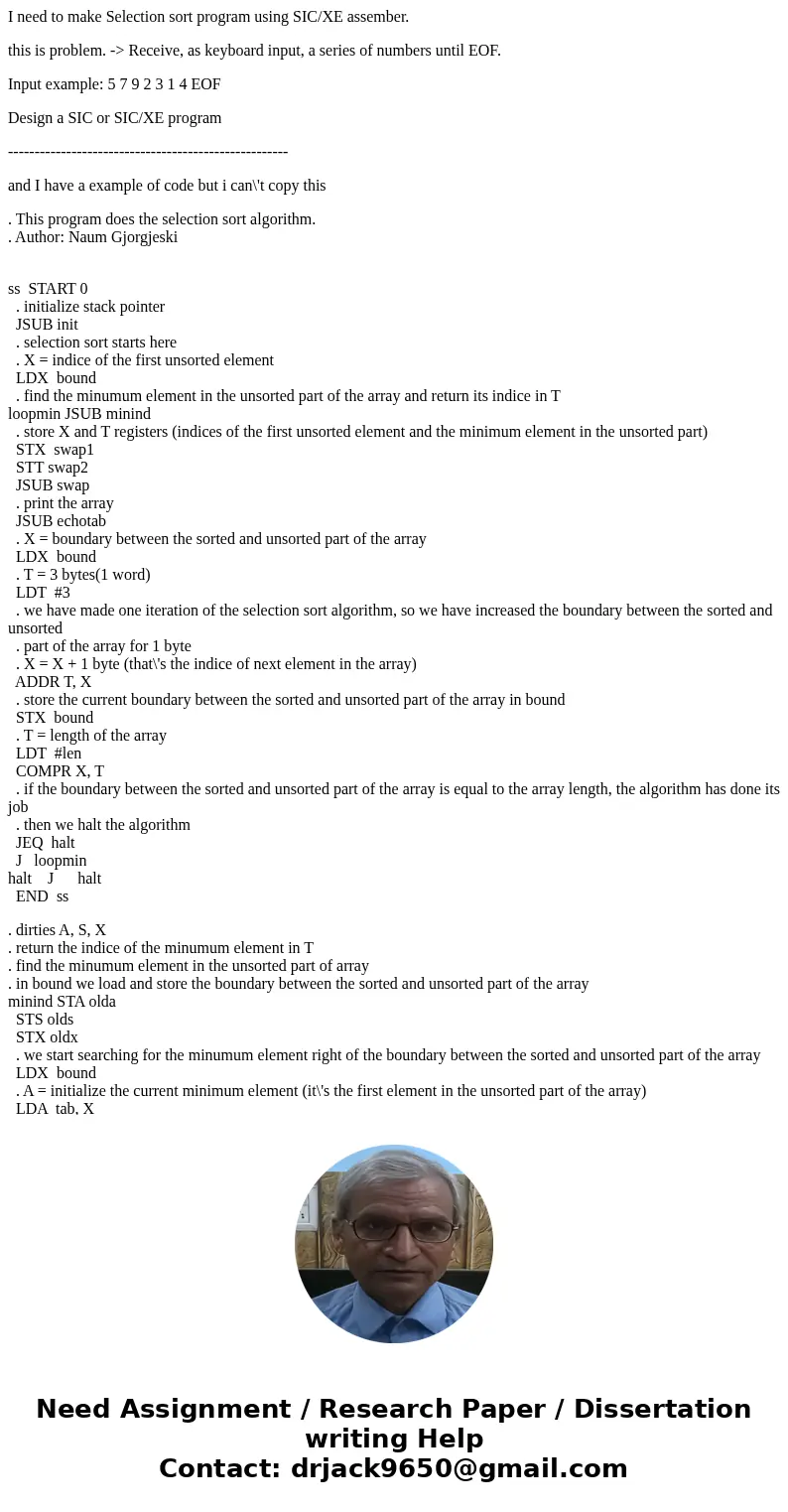
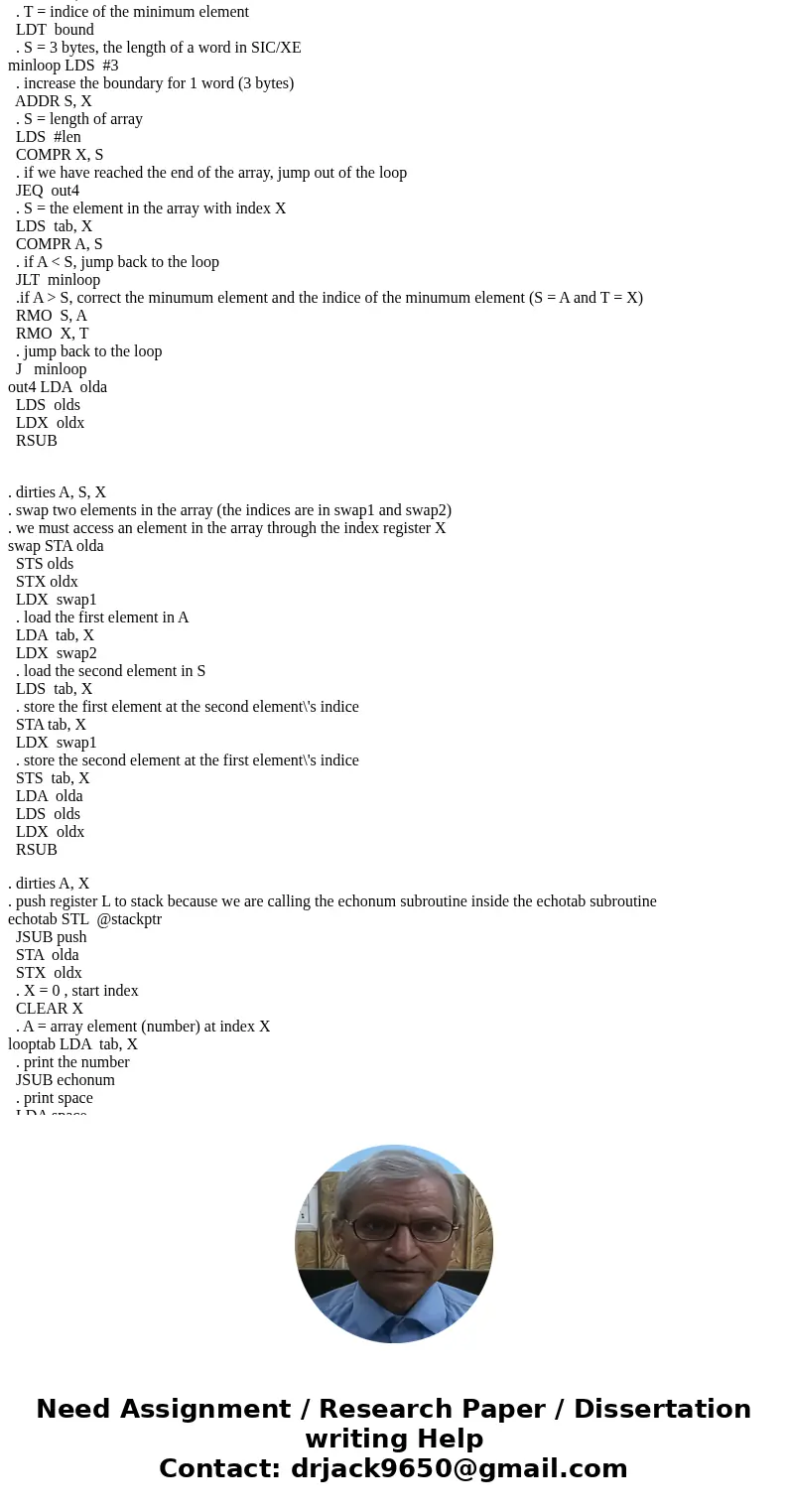
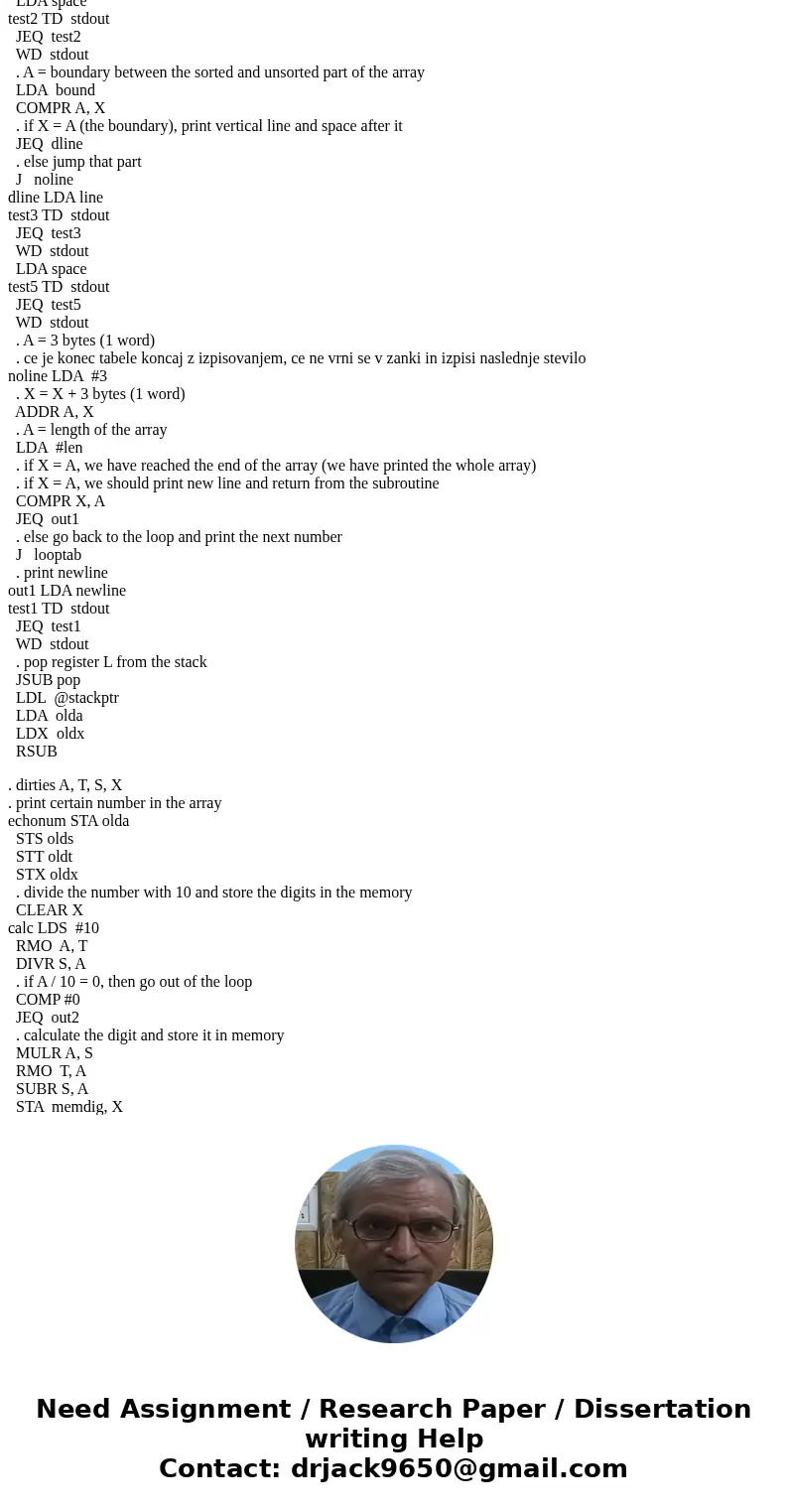
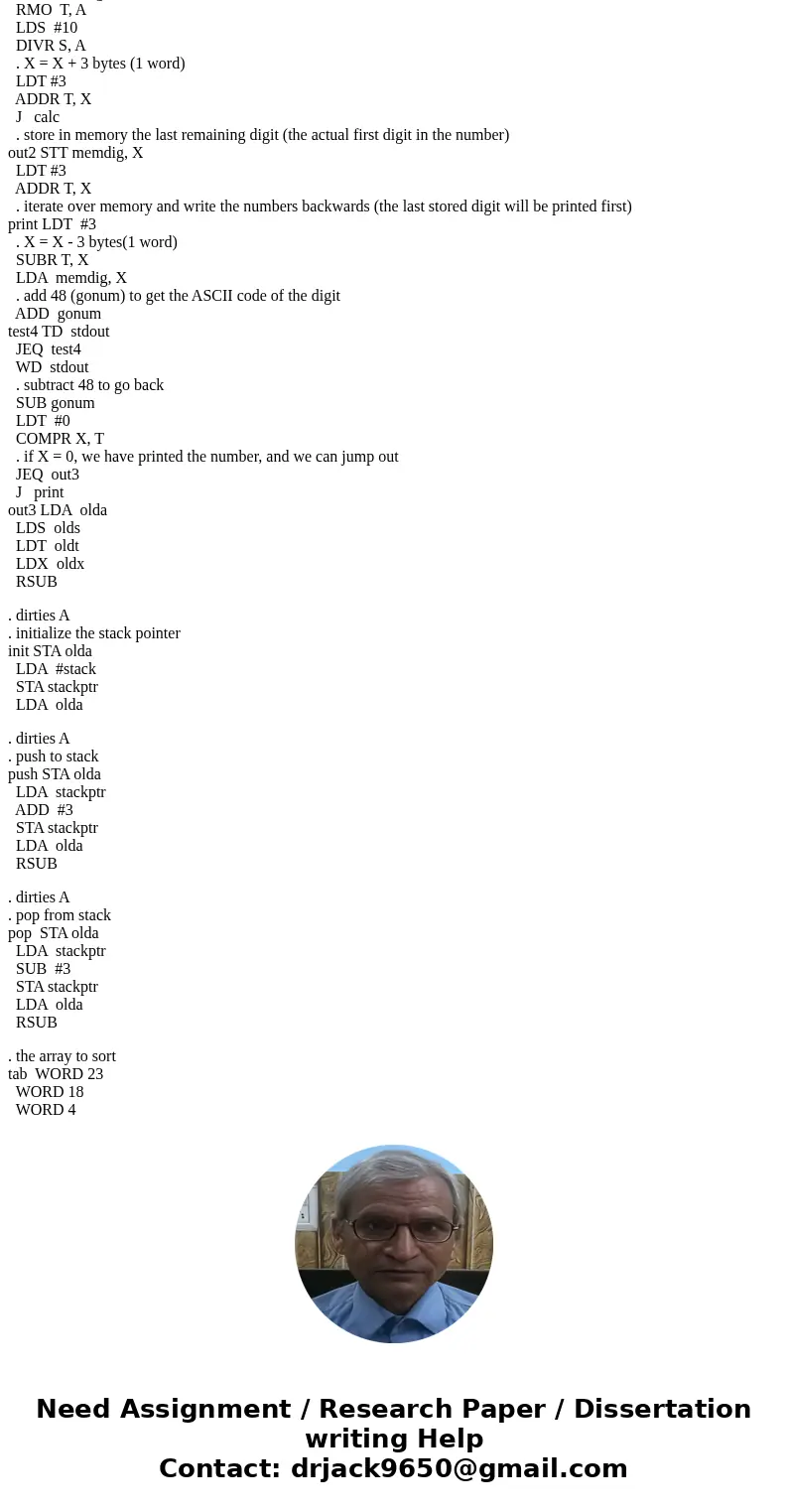
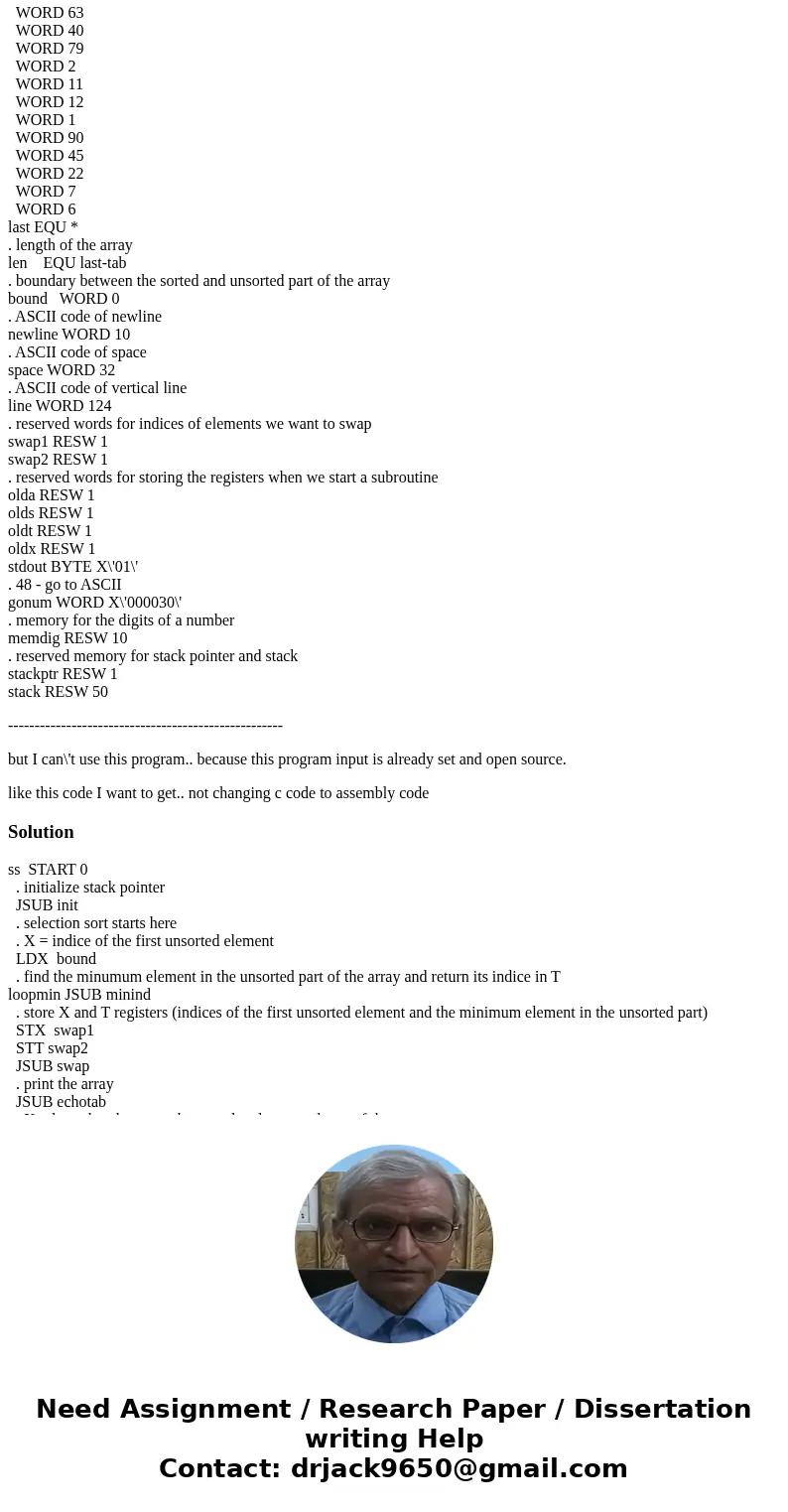
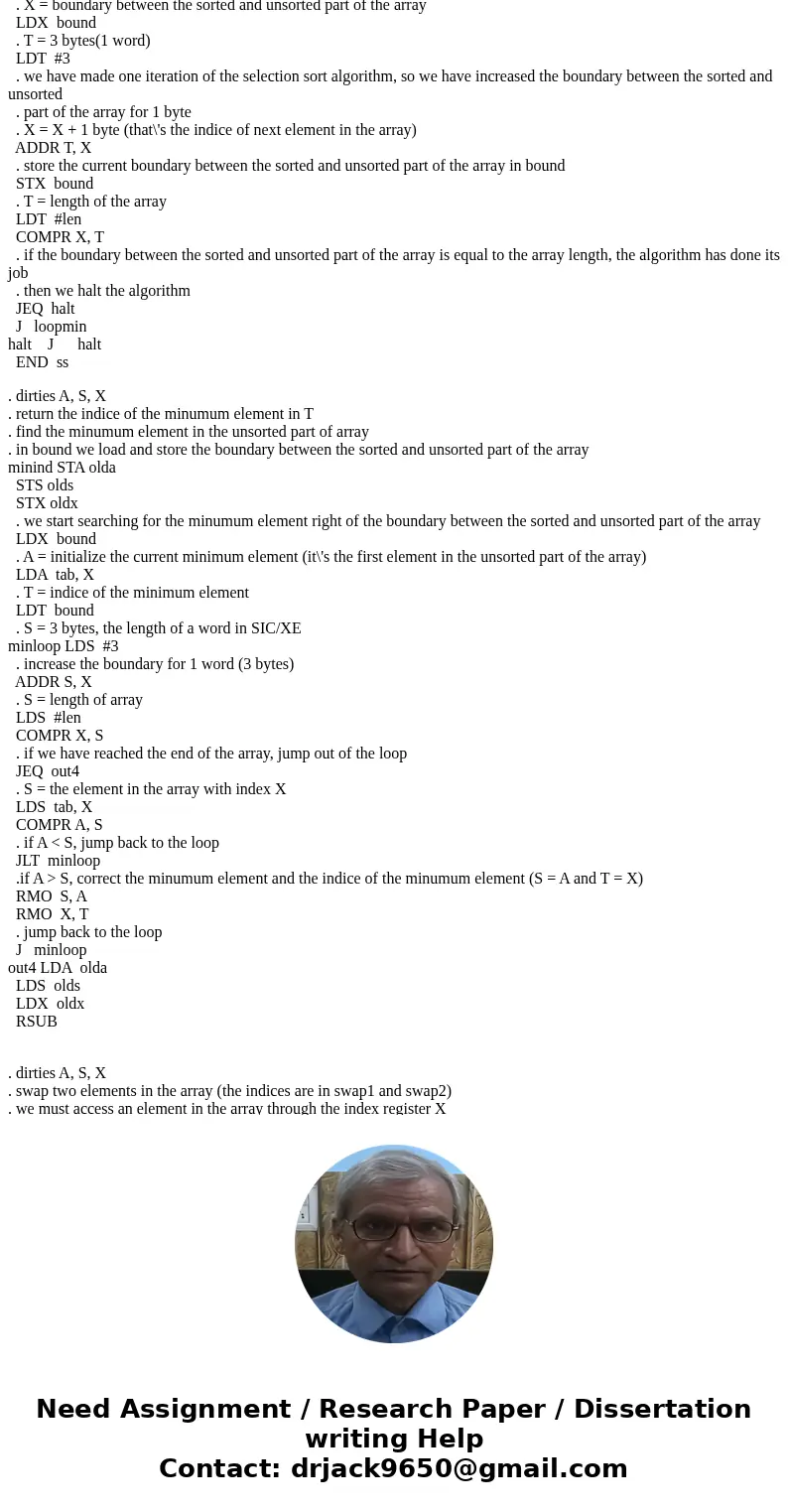
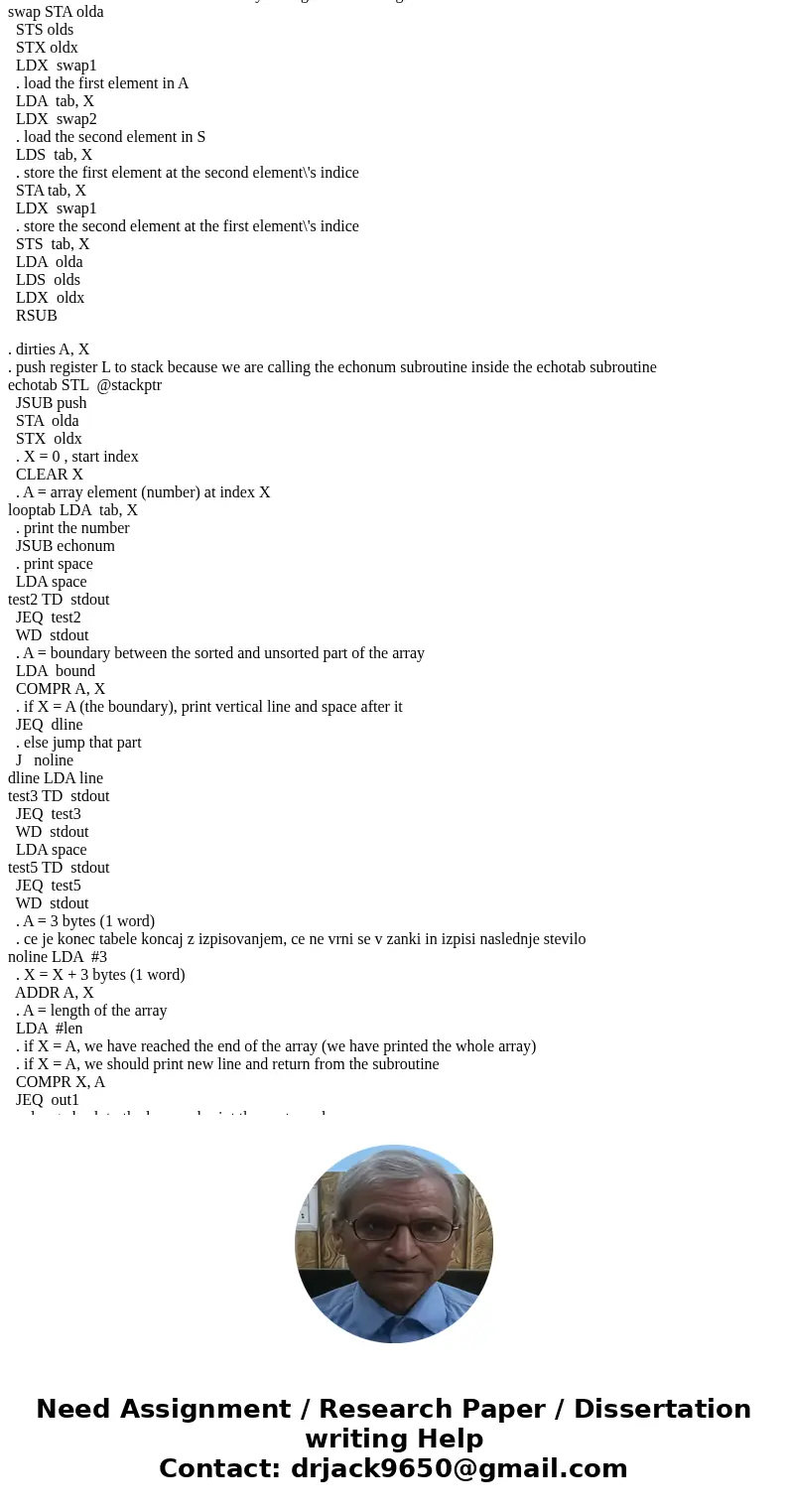
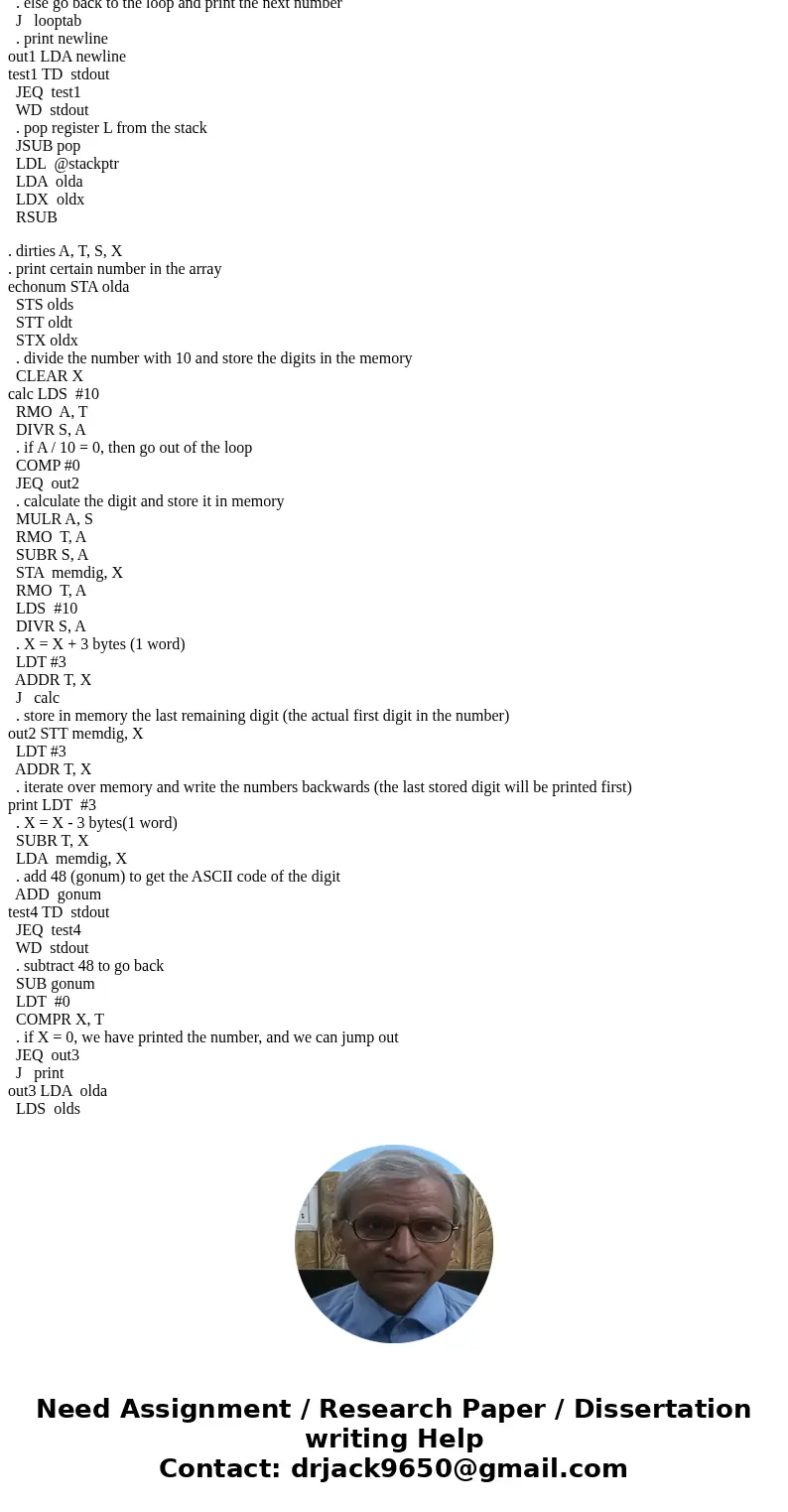
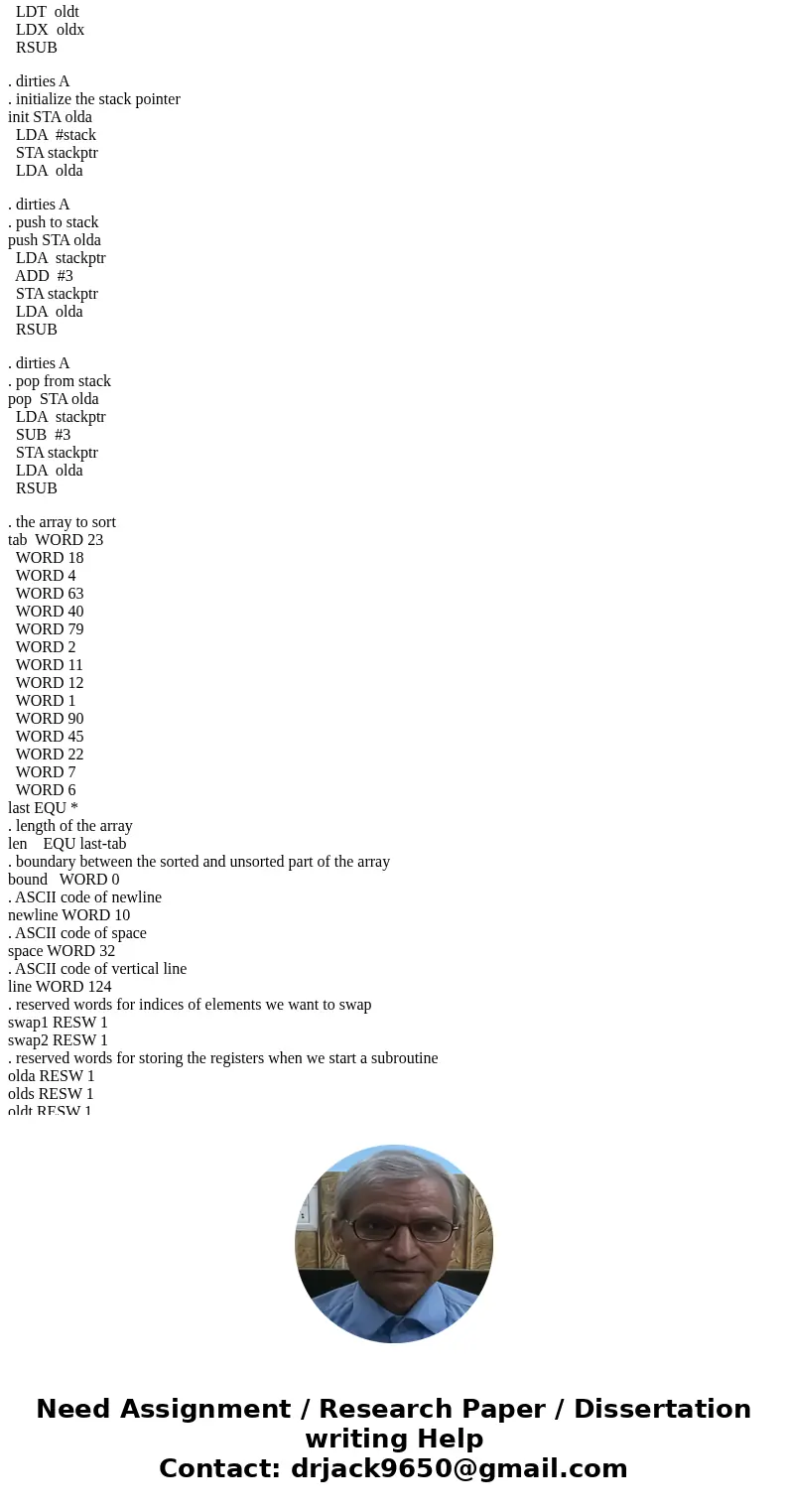
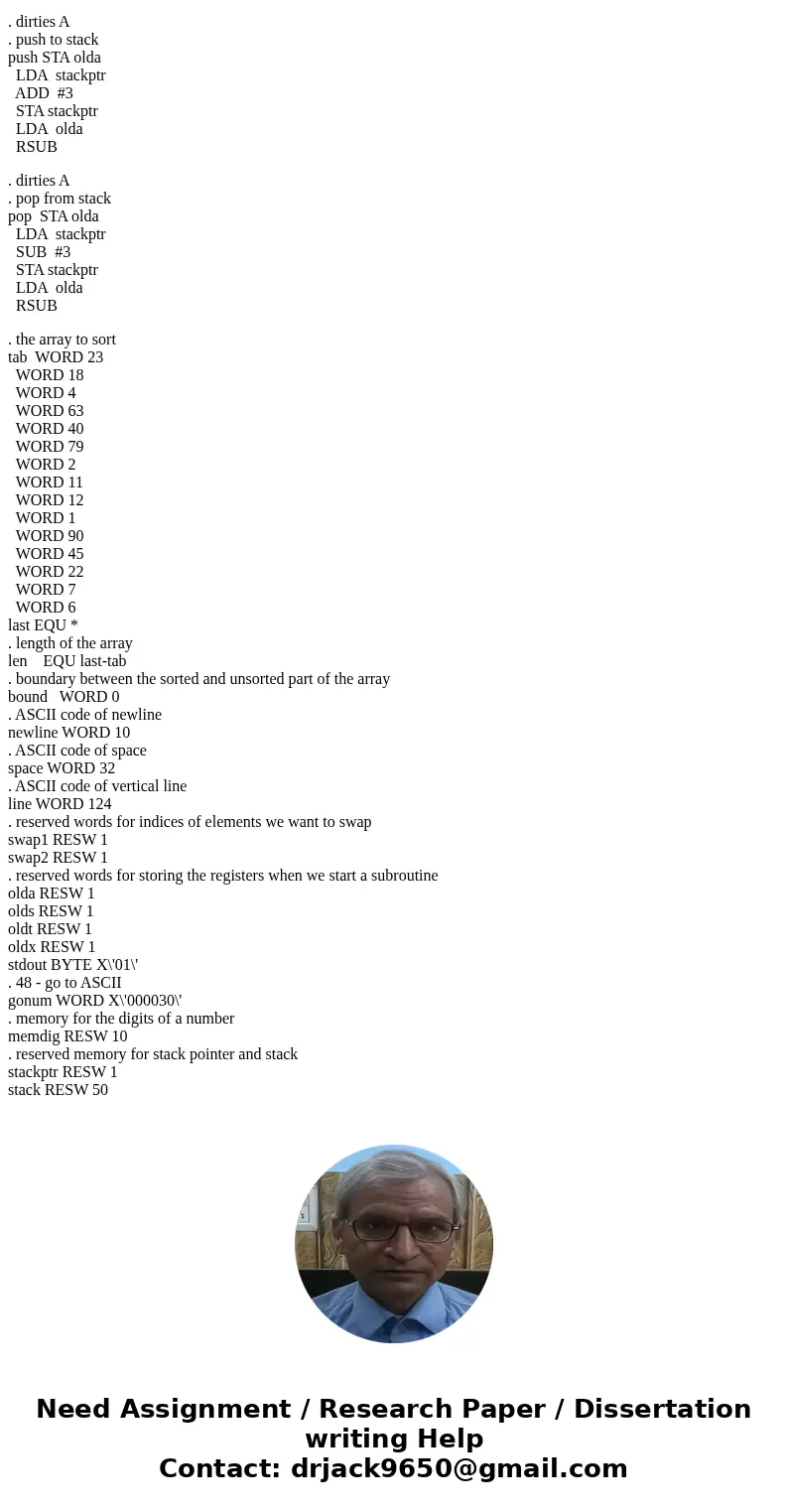
 Homework Sourse
Homework Sourse